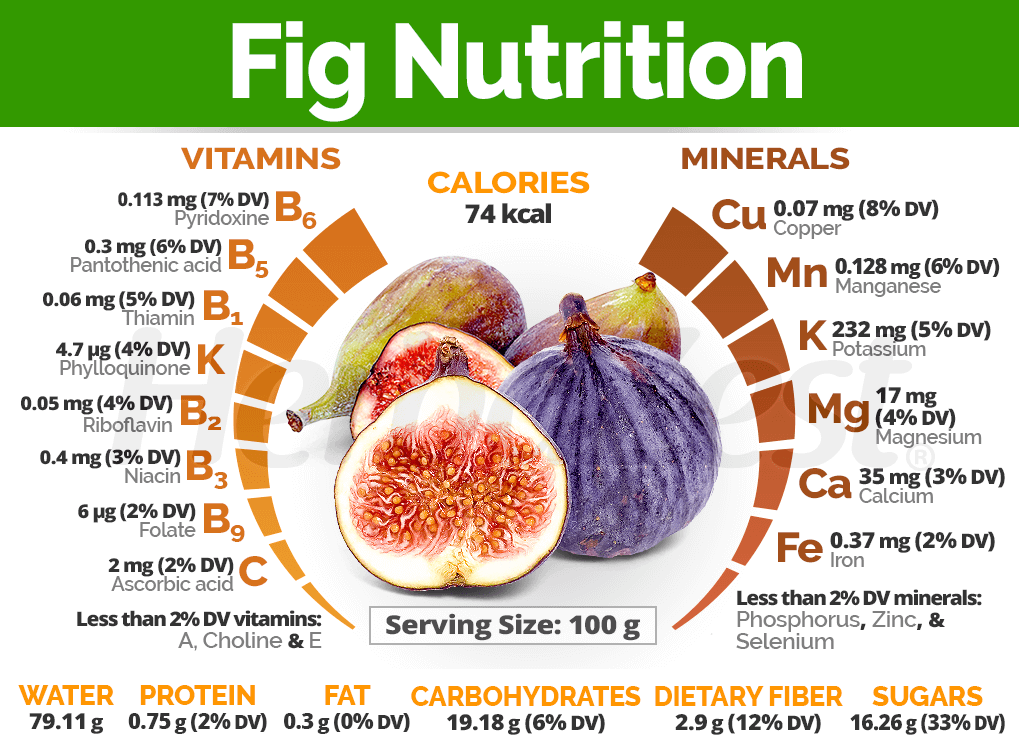Figs are nutrient-rich fruits offering fiber, vitamins, and minerals. They support digestion, heart health, and blood sugar control, and promote skin wellness.
In this article, we will explore the nutritional value of figs, their health advantages, and how they fit into a balanced diet.
What Are Figs?

Figs are the fruit of the Ficus carica tree, native to the Mediterranean and Western Asia. They come in purple, green, and yellow varieties, known for their soft texture and sweet taste. Fresh figs are juicy and delicate, while dried figs are chewy with a more concentrated flavor. Figs are often eaten as snacks or added to salads, desserts, and other dishes. Packed with nutrients, they offer health benefits, making them a great addition to a balanced diet.
The Nutritional Value of Figs:
Figs, particularly dried figs, are a great source of fiber, vitamins, and minerals. Below is a breakdown of the key nutrients found in figs:
High in Fiber:
Figs are an excellent source of dietary fiber. A medium-sized fresh fig contains about 1 gram of fiber, and dried figs have even more. Fiber is crucial for digestive health as it prevents constipation and promotes healthy gut bacteria. Additionally, a high-fiber diet is linked to improved heart health, better weight management, and better blood sugar control, making figs a great addition to your diet for overall health and wellness.
Rich in Vitamins:
Figs are packed with essential vitamins that support overall health. They contain Vitamin K, which aids in blood clotting and bone health; Vitamin B6, crucial for brain function and serotonin production; Vitamin A, important for eye and skin health; and Folate, which is necessary for red blood cell production and cell growth. These vitamins make figs a nutrient-rich fruit for maintaining good health and supporting various body functions.
Also read: Fitness Singles – The Ultimate Guide!
Packed with Minerals:
Figs are a great source of essential minerals. Potassium helps regulate blood pressure and supports muscle and nerve function. Magnesium is vital for muscle function, energy production, and bone health. Calcium is necessary for strong bones and teeth, while iron supports oxygen transport in the blood and boosts energy levels. Including figs in your diet can help provide these important minerals, contributing to overall wellness and proper body function.
Low in Calories:
Despite their natural sweetness and rich flavor, figs are relatively low in calories, especially when compared to other dried fruits. This makes them an ideal choice for those seeking a healthier, low-calorie option to satisfy sweet cravings. Their nutrient-dense profile allows you to enjoy their benefits without the worry of consuming too many calories, making figs a delicious yet healthy snack for those watching their calorie intake.
Health Benefits of Figs:

Now that we’ve explored the nutritional profile of figs, let’s look at some of the health benefits they offer.
Improves Digestive Health:
Figs are high in fiber, which is essential for digestive health. Fiber adds bulk to stool and promotes regular bowel movements, helping to prevent constipation. It also nourishes beneficial gut bacteria, supporting a healthy microbiome. Including figs in your diet can improve overall digestion and reduce digestive issues, contributing to a healthier gut and better bowel function. Their high fiber content makes figs a natural remedy for maintaining a smooth and efficient digestive system.
Supports Heart Health:
Figs support heart health due to their rich content of fiber, potassium, and magnesium. Potassium helps regulate blood pressure by balancing sodium levels, reducing the risk of hypertension. Magnesium supports heart muscle function, while fiber helps lower cholesterol levels, contributing to better cardiovascular health. Including figs in your diet can help maintain healthy blood pressure and cholesterol levels, promoting overall heart health and reducing the risk of heart disease.
Helps Manage Blood Sugar Levels:
Figs, especially dried figs, have a low glycemic index, meaning they release sugar slowly into the bloodstream. This helps manage blood sugar levels, making figs suitable for those with diabetes. The fiber content in figs also slows sugar absorption, preventing blood sugar spikes. Consuming figs in moderation can help regulate blood sugar levels, but it’s important to balance their intake within a well-rounded diet for optimal blood sugar control.
Also read: Planet Fitness Day Pass – The Ultimate Flexible Fitness Option!
Aids in Weight Management:
Figs can support weight management due to their low calorie and high fiber content. The fiber in figs helps keep you full longer, reducing the desire for unhealthy snacks. Additionally, figs regulate blood sugar, preventing energy crashes and cravings. By adding figs to your diet, you can enjoy a naturally sweet, filling snack without consuming excessive calories, making them an excellent choice for anyone looking to manage their weight while maintaining a balanced diet.
Boosts Bone Health:
Figs contribute to bone health with their calcium, magnesium, and vitamin K content. Calcium is essential for strong bones, while magnesium helps regulate calcium levels. Vitamin K aids in bone mineralization and reduces the risk of fractures. Consuming figs regularly can promote better bone health, particularly in older adults who are at risk for osteoporosis. Including figs in your diet supports the maintenance of strong bones and may help prevent bone-related conditions.
Enhances Skin Health:

Figs support skin health thanks to their high levels of vitamin A and antioxidants like polyphenols. Vitamin A maintains skin elasticity and prevents dryness, while antioxidants protect skin cells from damage caused by free radicals, delaying premature aging. Regular consumption of figs can improve skin texture, giving you a healthy, glowing complexion. Figs’ skin-nourishing properties may help maintain youthful skin by preventing damage from environmental stressors and promoting hydration.
Supports Immune Function:
Figs are rich in vitamin C, which plays a crucial role in immune function. Vitamin C helps stimulate white blood cell production, boosting the body’s defense against infections. Figs also contain antioxidants that fight harmful bacteria and viruses, strengthening the immune system. Including figs in your diet can enhance immune function, helping your body resist illness and stay strong, especially during cold and flu seasons. Their nutrient profile supports overall health and immunity.
Are There Any Risks or Side Effects?
Figs are generally safe for most people, but like any food, they should be eaten in moderation. Some individuals may experience allergic reactions, particularly if they have a latex allergy, as figs contain proteins similar to those found in latex. Additionally, dried figs are high in sugar and calories, so overconsumption can lead to weight gain or affect blood sugar levels. Eating too many figs, especially dried ones, can also cause digestive issues such as bloating, gas, or diarrhea due to their high fiber content.
Possible Side Effects of Overconsumption:
- High in Fiber: While fiber is beneficial for digestion, consuming too many figs, particularly dried figs, may lead to digestive issues like bloating, gas, or diarrhea.
- High Sugar Content: Dried figs are high in natural sugars, which can contribute to calorie intake. It’s important to balance your consumption to avoid excessive sugar consumption.
FAQ’s
1. Are figs good for digestion?
Yes, figs are high in fiber, which aids digestion, prevents constipation, and supports a healthy gut microbiome, improving overall digestive function.
2. Can figs help with weight management?
Yes, figs are low-calorie and fiber-rich, helping you feel full longer, reduce cravings, and support weight management efforts without excessive calorie intake.
3. Are figs beneficial for heart health?
Yes, figs contain potassium, magnesium, and fiber, which help regulate blood pressure, lower cholesterol, and promote overall cardiovascular health.
4. Can figs be eaten by people with diabetes?
Yes, figs have a low glycemic index, help regulate blood sugar, and are safe for diabetics when consumed in moderation as part of a balanced diet.
5. What are the skin benefits of figs?
Figs are rich in antioxidants and vitamin A, helping to maintain skin elasticity, prevent dryness, and reduce signs of premature aging for healthy skin.
Conclusion
In conclusion, figs are nutrient-dense fruits offering benefits like improved digestion, heart health, and blood sugar control. Rich in fiber, vitamins, and minerals, they support overall well-being. Whether fresh or dried, figs are versatile, low-calorie, and delicious, making them an excellent addition to a balanced diet. Moderation is key for maximizing their health benefits while avoiding potential side effects.